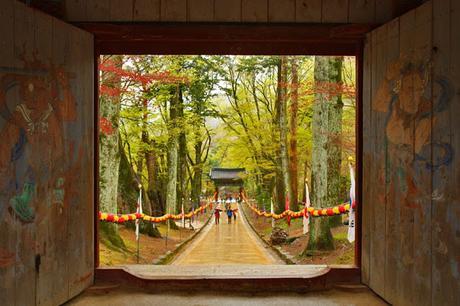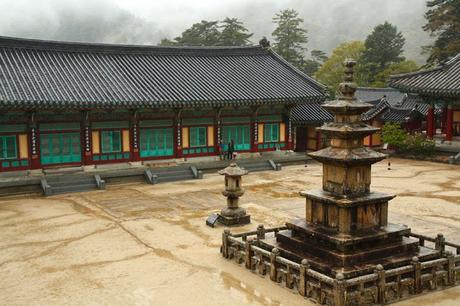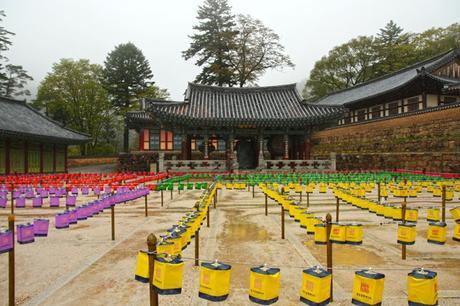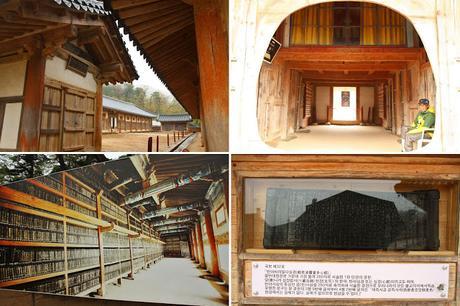Like the zombie in Train to Busan, I stumbled onto Car #8 of the KTX at the last minute, but Busan wasn't my final destination, it was Daegu (Dongdaegu/East Daegu Station), where I would transfer to the Daegu Metro/Subway to go to Seongdangmot Station and at exit 3 of Seongdangmot Station, find Daegu Seobu Bus Terminal where I would find the bus headed for Haeinsa Temple, home to another UNESCO World Heritage Site.
Haeinsa Temple is located in Hapcheon County, in South Gyeongsang Province (Gyeongsangnam-do). Throughout the hour and a half bus ride (KRW 7100 per way; bus leaves every 40 minutes), a few people got on and got off and most of them senior citizens. A nice elderly lady on the opposite aisle talked to me in Korean and though I did not speak her language and she did not speak mine, we understood each other (because I was the only foreigner on the bus, it was clear to her that I was headed to Haeinsa Temple and that I was traveling alone, and I guessed her questions were along those lines).
As we neared the bus stop for Haeinsa Temple, the nice elderly lady turned to a lady two rows behind me (who I am sure was a stranger to her too) who was also headed to Haeinsa Temple and she asked her to accompany me. The lady kindly agreed and I am grateful she did for the way to Haeinsa Temple from the bus stop wasn't that straightforward. She was in full hiking attire and walked quite fast. I tried to not to let my heavy breathing be too loud and be obvious that I was out of shape as we were making small talk (she told me she was from Busan and was here to hike the mountain, Gaya, on which the temple sits). I was embarrassed for being such a slow poke, so once we reached the temple, I thanked her and told her I'd stay behind and look around.
 Looking through the Phoenix Gate
Looking through the Phoenix Gate  Built in the center of the Haeinsa Temple is this three-storied pagoda and stone lantern
Built in the center of the Haeinsa Temple is this three-storied pagoda and stone lantern  Bumjonggak or the Temple Bell Tower houses a large drum, temple bell,carp-shaped wooden drum, and cloud-shaped metal plate.
Bumjonggak or the Temple Bell Tower houses a large drum, temple bell,carp-shaped wooden drum, and cloud-shaped metal plate.Haeinsa Temple was founded in the year 802. It has several buildings but it is the Janggyeong Panjeon Hall and what's in the hall that has been inscribed in the UNESCO World Heritage list. The Janggyeong Panjeon Hall is a wooden building in Haeinsa Temple that houses the 13th century Tripitaka Koreana consisting of more than 80,000 wooden blocks that have been carved with the Buddhist scriptures. What is amazing about this building is that it was designed (air circulation, moisture resistance, controlled temperature) in a way that it could protect the Tripitaka Koreana for thousands of years.
 Janggyeong Panjeon Hall and a sample of a Tripitaka Koreana
Janggyeong Panjeon Hall and a sample of a Tripitaka KoreanaThe Janggyeong Panjeon Hall can only be viewed from outside and the Tripitaka Koreana can only be glimpsed through the wooden slats of the building. There is one displayed outside (encased in glass) along with a photo of what is inside Janggyeong Panjeon Hall.
 Carvings on a wooden block
Carvings on a wooden blockMy stomach was rumbling after about two hours of exploring the temple: it was time to go back to Daegu and find a bus to Busan.
Haeinsa Temple해인사830AM to 5PMKRW 3,000
Tips:
* If you have your luggage with you, you may want to leave it in the lockers at Dongdaegu Station or Seongdangmot Station.
* Temple Stay is offered at Haeinsa Temple.
Getting to Haeinsa Temple from Daegu:Take the Daegu Metro/Subway to Seongdangmot Station, exit 3. Once you are out of exit 3, turn around and you will find Daegu Seobu Bus Terminal. Buses going to Haeinsa Temple leave the terminal every 40 minutes. One way ticket costs KRW 7,100.
Getting to Busan from Daegu:
Train
* From the KTX Dongdaegu Station, you can take the KTX (50 mins, KRW 17,100) or ITX (1 hour 15 mins, KRW 11,100) or Mugunghwa (1 hour 40 mins, KRW 7,500) to Busan.
* Alternatively, you can also go to Daegu Station and take the ITX (1 hour 20 mins, KRW 11,400) or Mugunghwa (1 hour 40 mins, KRW 7,700) from there.
Bus
* From the Metro/Subway Dongdaegu Station, take exit 4 and cross the street to find DongYang Express Bus Terminal. One way ticket from Daegu to Busan costs KRW 9,700 (1 hour 20 mins).
Daegu has many bus terminals and it was thanks to this four-year-old blogpost that I found the right ones.
South Korea on ThreeSouth Korea CountdownItinerary and ExpensesSouth Korea Solo: Tangible Essentials
Six Apps for a Smooth South Korea Trip
Incheon: Tail End of Cherry Blossom Season
Seoul Stays: Kam Guesthouse and Aroha Guesthouse
Seoul Food
Seoul: Songpa Naru Park and Banpo Hangang Park
Seoul: Wander Around City Hall Station
Seoul Art: Nanta!, Ihwa Mural Village, Dongdaemun Design Plaza (DDP)
Seoul World Heritage: Jongmyo Shrine, Seolleung and Jeongneung Royal Tombs
Gyeonggi: Village Walks in Paju City
Gyeonggi: Day Trip to Suwon City
Gyeongsangnam: Haeinsa Temple (you're here!)
(more soon)

